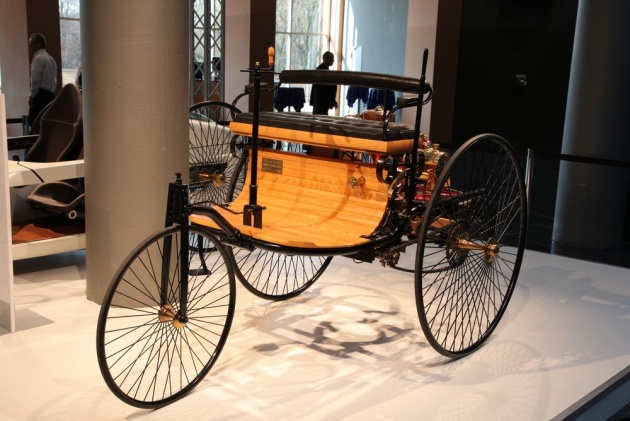
The history of the automobile is a long and winding road, and pinpointing exactly who invented the car is not a simple matter. But if you rewind the evolution of cars past GPS, past antilock brakes and automatic transmissions and even past the Model T, eventually you'll get to the Benz Motor Car No. 1, the missing link between cars and horse-drawn buggies.
Karl Benz patented the three-wheeled Motor Car in 1886. It was the first true, modern automobile. Benz also patented his own throttle system, spark plugs, gear shifters, a water radiator, a carburetor and other fundamentals to the automobile. Benz eventually built a car company that still exists today as the Daimler Group.
Benz patented the first gasoline-powered car, but he wasn't the original visionary of self-propelled vehicles. Some highlights in the history of the car:
- Leonardo da Vinci had sketched a horseless, mechanized cart in the early 1500s. Like many of his designs, it wasn't built in his lifetime.
- In 1769, a Frenchman named Nicholas-Joseph Cugnot built a self-propelled vehicle with a steam engine. The cart moved at a walking pace and was abandoned.
- Sometime between 1832 and 1839, Robert Anderson of Scotland invented the first electric carriage, which used a rechargeable battery that powered a small electric motor. The vehicles were heavy, expensive and required frequent recharging. They were abandoned in favor of gasoline-powered engines.
Internal combustion engines
Vital to the modern automobile is the internal combustion engine. This type of engine uses an explosive combustion of fuel to push a piston within a cylinder. The piston's movement turns a crankshaft that is connected to the car's wheels of a drive shaft. Like the car itself, the internal combustion engine has a long history. An incomplete list of developments includes:
- 1680: Christiaan Huygens, better known for his contributions as an astronomer, designed but never built an internal combustion engine fueled by gunpowder.
- 1826: Englishman Samuel Brown altered a steam engine to burn gasoline and put it on a carriage, but this proto-automobile also never gained widespread adoption.
- 1858: Jean Joseph-Etienne Lenoir patented a double-acting, electric spark-ignition internal combustion engine fueled by coal gas. He improved on that engine so it would run on petroleum, attached it to a three-wheeled wagon and traveled 50 miles.
- 1873: American engineer George Brayton developed a two-stroke kerosene engine. It is considered to be the first safe and practical oil engine.
- 1876: Nikolaus August Otto patented the first four-stroke engine in Germany.
- 1885: Gottlieb Daimler invented the prototype of the modern gasoline engine.
-
nnovative and entrepreneurial
Karl Benz gets the credit for inventing the automobile because his car was practical, used a gasoline-powered internal-combustion engine and worked like modern cars do today.
Benz was born in 1844 in Karlsruhe, a city in southwest Germany. His father was a railway worker who died in an accident when Benz was 2 years old. Although poor, Benz's mother supported him and his education. He was admitted to the University of Karlsruhe at age 15 and graduated in 1864 with a mechanical engineering degree.
Benz's first venture of an iron foundry and sheet-metal workshop flopped. However his new bride, Bertha Ringer, used her dowry to fund a new factory to build gas engines. With the profits Benz was free to start building a horseless, gas-powered carriage.
Benz had built three prototypes of his Motor Car in private by 1888, when Bertha decided it was time for some press. Bertha took the latest model in the early morning and drove her two teenage sons 66 miles to her mother's home. She had to improvise repairs along the way with shoe leather, a hair pin and her garter.
The successful trip showed Benz how to improve the car, and showed a dubious public that automobiles were useful. Benz demonstrated the Model 3 Motorwagen at the World's Fair in Paris the following year.
Benz died in 1929, just two years after he merged with fellow car-maker Gottlieb Daimler's company to form what is today the Daimler Group, manufacturer of the Mercedes-Benz.



